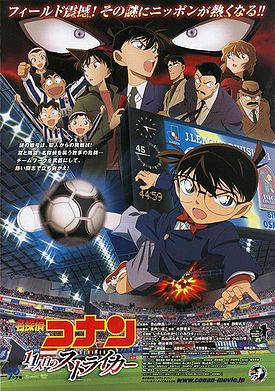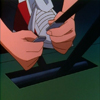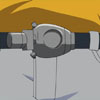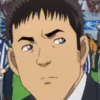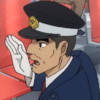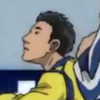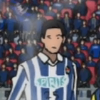The Eleventh Striker is the 16th movie in the Detective Conan franchise. It was released in Japan on April 14, 2012.
Characters introduced
Cast
Gadgets
Case
Situation
Kogoro's detective agency receives a mysterious phone call. Someone on the other end warns about a bomb and leaves behind a code, "The Boy in Blue and The Blue Zebra, the rain from above ..." After that, a car exploded in front of Mouri Detective Agency.
| Bombing
|
|
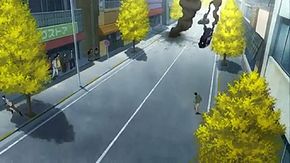
|
| Location:
|
Mouri Detective Agency
|
| Suspects:
|
Shinzou Yamamori, Kaoru Koda, Kazumasa Nakaoka, Ryousuke Sakaki and Keiichirou Motoura
|
| After a call from a suspicous man, a Blue Car in front of the building exploded!
|
|
If Conan can decipher the riddle, he can stop the bomb. An adventure begins for Conan and the Detective Boys, taking place at a soccer match between Hideo Akagi of the Tokyo Spirits and Ryusuke Higo of Big Osaka.
| Planted Bombs
|
|
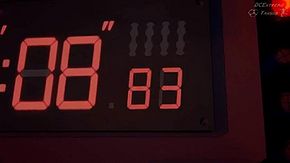
|
| Date:
|
November 20
|
| Location:
|
Touto Stadium
|
| Suspects:
|
Shinzou Yamamori, Kaoru Koda, Kazumasa Nakaoka, Ryousuke Sakaki and Keiichirou Motoura
|
|
Conan solves the first riddle and finds the bomb planting on the electronic scoreboard of Touto Stadium. He manages to inform the police to evacuate the fans on the Spirits side before the bomb explodes, thus leaving no casualties. However, only two weeks later, another threatening letter was sent to Mouri Kogoro's residence, announcing the bomber has installed bombs in all the stadiums and will explode at the end of the matches, unless certain conditions are satisfied. This time, no evacuation or bomb defuse attempts are allowed.
| Planted Bombs
|
|

|
| Date:
|
December 3
|
| Location:
|
All home team stadiums in J1 league
|
| Suspects:
|
Shinzou Yamamori, Kaoru Koda, Kazumasa Nakaoka, Ryousuke Sakaki and Keiichirou Motoura
|
|
The police and Conan solve the second code and inform the ten strikers of the teams to perform the secret action the culprit has demanded. Thanks to that, they successfully defuse the bombs in nine stadiums, and apparently the activation signal in the National Stadium is malfunctioned. Meanwhile, the police, led by Shiratori, investigates a potential suspect, Keiichirou Motoura. He has a clear motive for bombing: his son, Tomofumi, dies on the way to the hospital, where the ambulance carrying him was blocked by Mouri Kogoro for two minutes, and Motoura carries the crime out of revenge for his son. Motoura, while being angry at Mouri, denies that he install the bombs.
People
Real-life people
Resolution
The culprit
True criminal is Kazumasa Nakaoka. His motive is revenge for the death of Tomofumi Motoura, son of soccer coach, Keiichirou Motoura. Back when he was still able to play soccer, he met Tomofumi and the two became friends when Tomofumi begged to learn soccer from Kazumasa. Despite having a weak body, Tomofumi insisted on learnig to play the game which deeply moved Kazumasa. However, after Kazumasa's bike accident, which left him injured and unable to play, the two lost contact. A few years later when Tomofumi was in the 4th grade, the two met again with Tomofumi playing on his school's soccer team. Despite making it onto the soccer team however, Tomofumi never participated in any of the games because of his weak body. When he was given the chance to play during a game, Nakaoka made him a promise that the two would celebrate if Tomofumi made a goal, which he managed to do. On the day that Nakaoka went to celebrate with Tomofumi, he was told by his mother that Tomofumi had died in an accident coming home from practice one afternoon. This left him deeply distraught and upon learning from Tomofumi's father that the ambulance that was carrying Tomofumi to the hospital was stopped by a mob of people during a soccer match, Kazumasa grew bitter and resentful. Especially so after learning that a drunk Kogoro was the head of that very mob, at which point he decides to spend the next few years plotting revenge. Conan deduces that Nakaoka has installed bombs on ten stadiums, save the National Stadium where he achieves his high in his soccer career, luring Kogoro to Touto Stadium and planning commit suicide with Kogoro. Nakaoka points out that Conan's deduction contains a big flaw.
The case
Nakaoka explains that the bomb is also installed in National Stadium, but will explode at 5.50, 35 minutes later than other stadiums, and the key to defuse the bomb at National Stadium actually stays at Touto Stadium where he is standing. In one of his riddles, he reveals he's searching for an 11th striker that can end his revenge; otherwise, the bombs set in each of the stadiums will detonate, taking with them, the thousands of people attending the matches. He originally plans for it to be Kogoro; however Conan shows up instead after deciphering the code. With the help of Ayumi, Mitsuhiko, Genta and Haibara, Conan manages to deactivate the bomb despite being at a disadvantage. Nakaoka realizes that Conan was eleventh striker he was searching for.
In other languages
| Language |
Title |
Translation
|
 German German |
Der 11. Stürmer |
The Eleventh Striker
|
 Italian Italian |
L'undicesimo attaccante |
The Eleventh Striker
|
 Vietnammese Vietnammese |
Tiền đạo thứ 11 |
The Eleventh Striker
|
 Chinese Chinese |
第十一名前锋 |
The Eleventh Striker
|
Gallery
A promotional image for the 16th movie, from Shonen Sunday.
A promotional image for the 16th movie, from Shonen Sunday.
Trivia
- Several real life J. League soccer players provided voice work for animated versions of themselves in the film, including: Kazuyoshi Miura (Yokohama F.C.), Yasuhito Endo (Gamba Osaka), Yasuyuki Konno (Gamba Osaka), Kengo Nakamura (Kawasaki Frontale), and Seigo Narazaki (Nagoya Grampus).
- The movie brought 3.29 billion yen to box office.
- Kazumasa Nakaoka's motorbike is a Suzuki SV 650 S.
- The Car Explode Near Mouri Detective Agency is a 2001 Dark Blue Toyota Prius I [NHW11].
- In real life, J1 league has only 18 teams. In the movie, two fictional teams are added: Tokyo Spirits and Big Osaka. The movie takes place in the 2011 J-League season, with Tokyo Spirits is fighting for the champion, while Big Osaka is struggling at relegation place.
- In the credits, there is a mistake in Miyuki Tabeta's name since it is written Miyuki Tabuta.
See also
References
